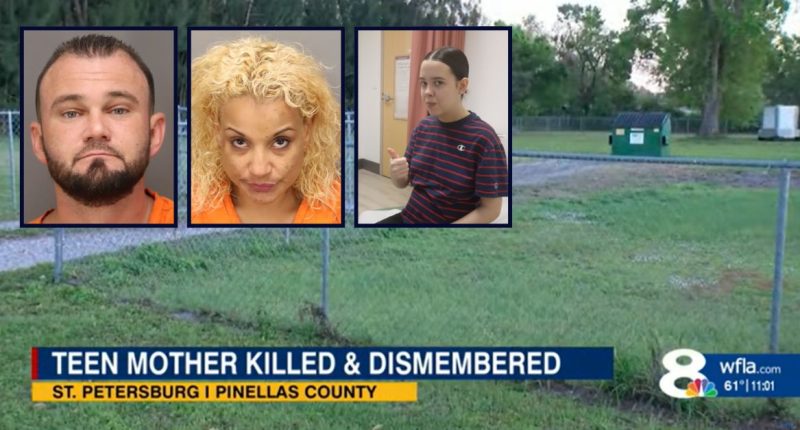Share this @internewscast.com
Insets, from left: Steven Gress, Michelle Brandes, and Miranda Corsette (St. Petersburg Police Department). Background: The dumpster where Miranda’s body was found (WFLA/YouTube).
A Florida couple accused of killing a teenage girl reportedly connected with the 16-year-old through Grindr’s “twink” section before allegedly smothering her with a billiard ball and later dismembering her body, as described in a lawsuit.
The estate representing Miranda Corsette, referred to as M.C., has initiated legal action in Florida’s U.S. Middle District against the dating app commonly used within the gay community. The lawsuit claims that Grindr’s “reckless and careless reliance on self-reported age verification” enabled Miranda to join the app and come into contact with “predators” such as 35-year-old Steven Gress, who now faces murder charges related to her death.
The lawsuit alleges nine counts against the company, including negligence, wrongful death, participating in sex trafficking and inflicting emotional distress.
“Long before February 14, 2025, it was clear to Grindr that it was only a matter of time before its app, as Grindr marketed it and designed it, would cause the torture, rape, and murder of a child,” plaintiff lawyers write.
Love true crime? Sign up for our newsletter, The Law&Crime Docket, to get the latest real-life crime stories delivered right to your inbox.
It was on that day that Gress found Corsette on the app thanks to the geolocation technology that matches people who are nearby and set up an in-person meeting with her, which would eventually lead to her brutal demise, according to the suit.
“Grindr’s lack of age verification and platform design substantially contributed to M.C.’s death. M.C. was just sixteen years old — a child when her life was stolen,” plaintiff lawyers write.
The app created a “dangerous platform, motivated solely by unreasonable financial gain,” the lawsuit said. It had a “twink tribe” category, which attracts people who are young-looking who could be minors that sexual predators target, according to the complaint.
Other dating apps have biometric age verification systems with facial recognition technology that is over 99% accurate, plaintiff lawyers note. Meanwhile, Grindr asks users to type in their birth date, allowing minors to easily lie about their age to gain access to the app, per the plaintiffs.
More from Law&Crime: ‘Is whooping your child a sin?’: Murdered woman to leads discovery of bloodstained Minnie Mouse bed and body of 2-year-old girl in bayou
According to the lawsuit, Grindr has ignored user complaints about minors accessing the app and a 115-page report by a magistrate from the Middle District of Florida that “cast a stark light on the risks posed” by the app’s platform, among other warning signs.
Plaintiff lawyers say the app is liable as a “sex trafficking venture,” is negligent and intentionally inflicted emotional distress on the victim’s family. The app did not immediately return Law&Crime’s message seeking comment.
As Law&Crime previously reported, Gress and his girlfriend Michelle Brandes, 37, following the alleged murder, needed to dispose of the victim’s remains — but first, they needed to celebrate Brandes’ birthday, cops wrote in a search warrant request obtained by the Tampa Bay Times. Gress and Brandes ate chicken at Popeyes and then played mini golf at Congo River in Clearwater, the 25-page warrant written by the St. Petersburg Police Department reportedly said. After their birthday bash, the two suspects allegedly drove around the Tampa Bay area looking for places to dispose of Corsette’s body.
Eventually, they found a dumpster near where Gress’ grandparents lived in Ruskin and tossed Corsette’s remains there, the warrant reportedly said. Cops believe the dumpster was taken to a landfill and its contents — including Corsette’s remains — were incinerated, leaving prosecutors to try and convict the couple without a body.
Prosecutors are seeking the death penalty against Gress and Brandes.
Helping the state’s case is the fact that at least six people saw Corsette with the couple or knew she was being tortured, the warrant seeking to obtain the contents of Gress’ mother’s phone reportedly states. Gress was allegedly known by neighbors to take disadvantaged women into his home. Corsette, a mother of a 1-year-old child, was a frequent runaway with mental health and drug issues, cops said. Detectives believe Gress and Corsette met on a dating app and took her to his home in mid-February. Gress allegedly spoke to neighbors about the girl and even bragged to them about hurting her.
More from Law&Crime: ‘The roller coaster was a defective product’: Man stuck in tilted position on broken ‘Harry Potter’ ride at Universal for an hour, lawsuit says
Detectives also questioned a woman who lived with the defendants. She accused Gress of being abusive and he would buy animals off Craigslist and kill them by throwing them off a bridge, the warrant reportedly stated. Not long into Corsette’s stay, he accused her of stealing his ring, cops reportedly wrote. This sparked the weeklong abuse and torture, cops allege. As the alleged torture continued, Brandes said she found the ring. The roommate thought Brandes probably had it all along and took it so he would ditch Miranda, according to the warrant.
“This little b— stole my ring and won’t give it back,” Gress reportedly told the roommate. “So I’ve been beating her a—.”
The woman reportedly told detectives on Feb. 23, the day of Corsette’s death, that the defendants stuffed a billiard ball in the girl’s mouth and wrapped plastic around her head. Corsette suffocated.
The St. Petersburg Police Department said in a March 7 press release that Gress picked up the girl on Feb. 14 after meeting her on a dating app and took her to his home in the 2700 block of 27th Ave. N. After hanging out that day, he drove her back to her home. Corsette returned to his home the next day, and this time she would not make it out alive.
After killing, Miranda, Gress and Brandes placed the teen’s body in his car and drove the remains some 15 miles to a home in the 12000 block of Mallory Drive in Largo, cops said. There, police believe she was dismembered. Her remains were once again moved, this time to a dumpster about 55 miles away, according to police.
Miranda’s grandmother, who had custody of her after both of her parents died, reported her missing to Gulfport police on Feb. 24. Her grandma told police Corsette was known to run away and usually would return home, but not this time.
On March 6, a “witness” contacted police regarding information about a kidnapping and homicide. Police realized they already had Gress in custody after he allegedly pointed a harpoon at Brandes and was in possession of drugs. Detectives quickly unfurled the case, and Brandes turned herself in on March 8.
Gress was quite chatty during his first appearance.
After the judge read the allegations against him, he reportedly told the court, “They just said I suffocated,” before a public defender quickly intervened and ordered him to “not say anymore!”
Gress also questioned the court about the whereabouts of Brandes.
“Where is Michelle Brandes at?” Gress asked twice, video from local Fox affiliate WTVT showed.
“Talk to your lawyer,” the judge sternly advised Gress before ending the hearing.
Both Gress and Brandes stand accused of first-degree murder and are being held at the Pinellas County Jail without bond. They are next due in court for pretrial hearings scheduled for July 8.















